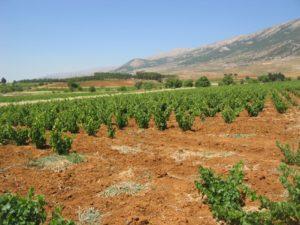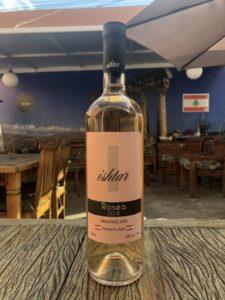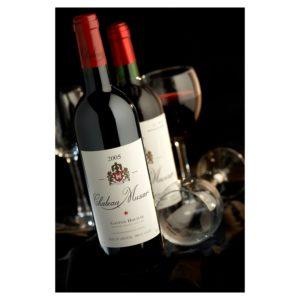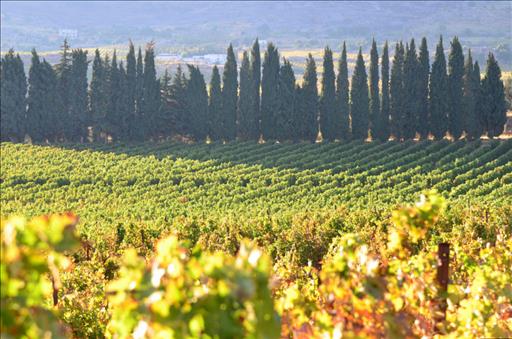
Beqaa Valley reinvents Lebanese wine, exports to Brazil
São Paulo – The history of wine making in Lebanon is ancient. But the hiatuses the country went through made the region lesser known among many wine enthusiasts. The country was marred by a wine production downtime during the Ottoman Empire and the civil war that struck the nation from the 70's through the 90's. Pictured above, grape vineyard in the Beqaa Valley in Lebanon.
Starting from the 90's, the resumption of production in the Beqaa Valley region started to change this. According to Brazilian importer , founded by Lebanese descendant siblings, from that moment on production in the Arab country began to grow back again and the number of wineries went from five to over forty as of 2010.
Neither the Old nor New World
In the wine universe, much is said about the production of Old World and New World countries. For the Lebanese wine, it's a different story. ''Wines from Lebanon, because of the region, could be seen as wines from the Old World. But since there was a long period without production, they are not. But they aren''t wines from the New World either. It's a class of its own,'' Marketing manager Rodrigo Mainard told ANBA.

Château Musar has made wine since 1930
The supplier of the importer is Château Musar, owned by the Hochar family of wine growers. During the civil war, Serge Hochar, who led the winery, was one of few growers to keep harvesting. ''The point is that, during the war, it was very dangerous to work, and exporting required a ridiculous logistic. And they managed to do so in troubled times,'' Mainardi stressed.
Beyond the country's history, the executive points out that the product stands out because of the natural conditions of the condition, which are ideal for grape production. ''The Beqaa Valley is a very good region. It has some altitude but is flat. The climate and the soil also allow for a slower ripening,'' the manager stressed.
From the same region come the wines sold in Brazil by Zahil. The brand represents the wines by Château Kefraya, Lebanon's second largest wine grower. ''Lebanese wines are very close to those from regions such as Bordeaux and Rhône, as they were greatly influenced by the French during the time it was under their rule. Its wines stand between the New-World – intense and ripe fruit – and the Old-World style – elegant and with ageing potential,'' the importer said in a news release.

Wines sold by Alyah Sweets are also produced in the Beqaa Valley region
Zahil has been active for 35 years and buys and distribute all the products without intermediaries. ''We work only on an exclusive basis of representation in Brazil with the wines we import,'' the brand's spokespeople said.
Another Brazilian brand that sells Lebanese wines is pastry shop. The São Paulo-based store produces and sells Arab delicacies prepared by Lebanese chefs that are now living in Brazil, as well as Arab beverages. ''We have three red, two rosé and two white wines. These wines are very characteristic of the region. One of the white wines has a single grape that's typical from Lebanon. The Obeidy grape is the same used to produce the traditional arak,'' the brand's spokesperson was quoted as saying in a new release.
- You may also enjoy reading:
The company buys its Lebanese full-bodied wines from the Beqaa Valley. In the case of Alyah, however, the purchase happens through established importers in Brazil, and directly from the producers as Zahil and Mistral do.
Farm to table
When it started importing, one of the first connections that Mistral made was the grower family of Château Musar. ''After it started, the market evolved very quickly. At that time, Mistral owner Ciro Lilla started searching for big wine names. And he went after Château Musar. This wine went beyond Lebanon. It was much better known than the country name [in the industry]. Over the years, many other good producers came,'' Mainardi said.

Wines by the Lebanese brand have a good ageing potential
To export, he says that the Lebanese winery has an office in Europe. ''Apart from them, other Lebanese brand that contacted me said they have an overseas office to make exporting easier. They probably do that to prevent problems, something they learned for living during the civil war,'' he considered.
In Brazil, there's still another factor that draws consumers to the wines from Lebanon. ''We''ve had a great relation with this winery for over 20 years. And they are particularly interested in Brazil because of the large Lebanese colony that lives here,'' he said on the ties of affection that also boosts consumption.
In addition to descendants, the English critics are also enthusiasts of the Château Musar bottles, Mainard explains. The reasons include their winemaking process. ''And the owner made this wine inspired by the Château de Bordeau of old times. He was in this French region and was greatly influenced by them, so his wine has a very traditional style and a good ageing potential. They can be bought for 30 to 40 years,'' he said.
Mistral has red and white wines of the brand, as well as a more recent line, Jeune. The bottles are called jeune, which is French for ''young'', because they aim to be different from other bottles of the brand. ''The line is for those who want to buy a wine that will age for years, but while they wait they can taste the Jeune wines. This helps breaking into markets as people now are used to consume wine immediately,'' he finishes.
Translated by Guilherme Miranda
Antoine Lorgnie/AFP Château Musar/Press Release Alyah Sweets/Press Release Château Musar/Press ReleaseThe post appeared first on .
.jpg)
Legal Disclaimer:
MENAFN provides the
information “as is” without warranty of any kind. We do not accept
any responsibility or liability for the accuracy, content, images,
videos, licenses, completeness, legality, or reliability of the information
contained in this article. If you have any complaints or copyright
issues related to this article, kindly contact the provider above.

















Comments
No comment